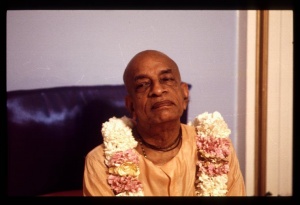CC Madhya 25.114: Difference between revisions
No edit summary |
(Vanibot #0054 edit - transform synonyms into clickable links, which search similar occurrences) |
||
| Line 17: | Line 17: | ||
<div class="synonyms"> | <div class="synonyms"> | ||
''aham eva'' | ''[//vanipedia.org/wiki/Special:VaniSearch?s=aham&tab=syno_o&ds=1 aham] [//vanipedia.org/wiki/Special:VaniSearch?s=eva&tab=syno_o&ds=1 eva]'' — I only; ''[//vanipedia.org/wiki/Special:VaniSearch?s=śloke&tab=syno_o&ds=1 śloke]'' — in this verse; ''[//vanipedia.org/wiki/Special:VaniSearch?s=aham&tab=syno_o&ds=1 aham]'' — the word ''aham''; ''[//vanipedia.org/wiki/Special:VaniSearch?s=tina&tab=syno_o&ds=1 tina]-[//vanipedia.org/wiki/Special:VaniSearch?s=bāra&tab=syno_o&ds=1 bāra]'' — three times; ''[//vanipedia.org/wiki/Special:VaniSearch?s=pūrṇa&tab=syno_o&ds=1 pūrṇa]-[//vanipedia.org/wiki/Special:VaniSearch?s=aiśvarya&tab=syno_o&ds=1 aiśvarya]'' — full of all opulences; ''[//vanipedia.org/wiki/Special:VaniSearch?s=śrī&tab=syno_o&ds=1 śrī]-[//vanipedia.org/wiki/Special:VaniSearch?s=vigraha&tab=syno_o&ds=1 vigraha]'' — of the transcendental form of the Lord; ''[//vanipedia.org/wiki/Special:VaniSearch?s=sthitira&tab=syno_o&ds=1 sthitira]'' — of the existence; ''[//vanipedia.org/wiki/Special:VaniSearch?s=nirdhāra&tab=syno_o&ds=1 nirdhāra]'' — confirmation. | ||
</div> | </div> | ||
Latest revision as of 23:12, 19 February 2024
Śrī Caitanya-caritāmṛta - Madhya-līlā - Chapter 25: How All the Residents of Vārāṇasī Became Vaiṣṇavas

His Divine Grace
A.C. Bhaktivedanta Swami Prabhupada
A.C. Bhaktivedanta Swami Prabhupada
TEXT 114
- "aham eva"-śloke ‘aham'-tina-bāra
- pūrṇaiśvarya śrī-vigraha-sthitira nirdhāra
SYNONYMS
aham eva — I only; śloke — in this verse; aham — the word aham; tina-bāra — three times; pūrṇa-aiśvarya — full of all opulences; śrī-vigraha — of the transcendental form of the Lord; sthitira — of the existence; nirdhāra — confirmation.
TRANSLATION
"In the verse beginning 'aham eva,' the word 'aham' is expressed three times. In the beginning there are the words 'aham eva.' In the second line there are the words 'paścād aham.' At the end are the words 'so 'smy aham.' This 'aham' indicates the Supreme Person. By the repetition of 'aham,' the transcendental personality who is complete with six opulences is confirmed.